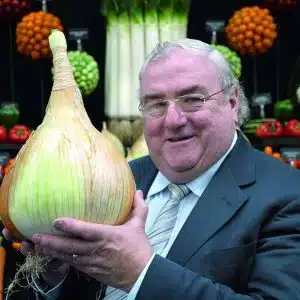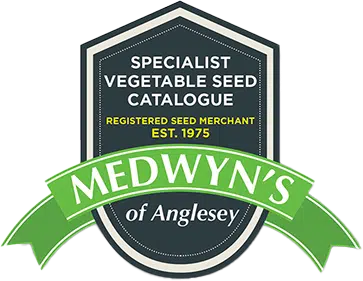Home - Growing Cabinet

Medwyn Williams
Hello. I'm Medwyn Williams – eleven times Gold medal winner at the Chelsea Flower Show, Past Chairman of the Royal Horticultural Society Fruit Vegetable and Herb Committee and President of the National Vegetable Society.
Growing Cabinet
My growing cabinet has been fully utilised from early November with the leeks initially having the benefit and then followed on by the onions. None of these plants were subjected at any point to a 24 hour period of constant artificial lights. They were all given 16 hours initially and that has now been reduced to matching day length and towards the end of this month the lamps will all be switched off.
This is the time of year when you really find out how many plants you need of everything that you have sown and probably the time when it’s better to be kind on yourself rather then on the plants. Space is most certainly always at a premium with me therefore I take stock of everything that I need in order to maximise on bench spacing. With leeks and onions I always pot on more than I need in order to be selective at the various potting stages, However as I also plant a few leeks and onions down in Jims’ polytunnel, the weakest plants will be taken there, initially into his warm greenhouse. If you think that you have more than you need and space is getting a major problem, why not offer some to a friend who may well be happy to grow them on.
Growing Cabinet
My growing cabinet has been fully utilised from early November with the leeks initially having the benefit and then followed on by the onions. None of these plants were subjected at any point to a 24 hour period of constant artificial lights. They were all given 16 hours initially and that has now been reduced to matching day length and towards the end of this month the lamps will all be switched off.
Construction
My growing cabinet has been constructed from panels of hardboard lined with silver backed polystyrene foil and these will now be dismantled to allow natural daylight to get at the plants. The plants will have lights still on to supplement them on dark dull days and as they are only on during daylight hours the artificial lights will not cause a bother to my neighbours. It is very important from now on, as the plants are increasing in size to make sure that they are all given as much attention to detail as you can, the time spent on the finer points can easily be the difference between possibly winning and losing.
Keeping plants erect
With all plants it’s important that they grow perfectly erect and this is certainly true with both leeks and onions as a plant that”s allowed to grow on with no attention at all will soon end up giving you grave problems. At this time you must remember that the plants are in larger pots developing a strong root system which in turn produces a large heavy plant. Very soon there will come a point when any manipulation of the plants stem or barrel will be pointless as they will have grown so strong that any bent barrels can no longer be brought into line.
Make sure also that the onions are kept perfectly erect, it’s only the most erect onions that eventual make the best shaped bulbs and without a doubt the best way of keeping both the onions and leeks erect is by straight split canes and plastic plant support clips. These can be utilised to form a complete circle around the plant, effectively a cage which means that they continue to grow upright. Help of course can be given to maintain straight leeks through the use of thick walled pipe insulation material with a bore size to suit the diameter of your barrel.
These are certainly helpful in keeping your plants upright, but do be aware that they need checking often; if kept on too tight, they can mis-shapen your leek. I am often asked how and when do I feed my leeks and onions, well the answer is that I haven”t fed my leeks or onions in pots at home for the Summer shows for many years. The reason is that I use good compost and the Levington professional range suits my needs perfectly and as they are regularly potted on into fresh compost right through to planting out in the polytunnels, they really do not need any supplementary feeding.
Feeding
There is however a vast difference with growing my leeks and onions for Chelsea in containers, even though they are also regularly potted on, there comes a time when they have to be in the same compost and in their last container for weeks prior to being harvested. In such cases supplementary feeding is a must in order to satisfy the plants nutritional needs. Any vegetable plant that is in the same pot and the same compost for over four weeks needs a little regular feeding to maintain a good growth rate. It really is just common sense; as soon as you plant is potted on into fresh compost it’s immediately taking nutrients out of it in order to grow so those nutrients have to be replenished on a regular basis.
Initially the liquid feeds are based on a higher ratio of Nitrogen to boost growth but once the leeks and onions have attained a useful size then I shall slowly revert to a balanced feed ending up with a final few feeds of a higher potash ratio to harden up the plant.
Pests and Diseases
Keep a close eye on your onion and leek plants from now on for pests and diseases. The greenfly can colonise quickly as the warm weather comes in but thankfully it’s no major problem to keep it at bay.
The same however can not be said about the western flower thrip which can cause absolute mayhem on you plants. With both leeks and onions it pays to have a regular look right into the growing heart of the plants. Spread the flags out carefully and with good eye sight you can see them moving around inside the younger developing leaves and if left to their own devices their constant pecking at the leaves will leave them silvered over. Sadly this is the first time that some growers become aware that they have a problem and very often the mistakenly think that because the leaves are silvered or grey they think it’s a disease such as mildew and commence to spray with a fungicide which will do nothing to alleviate the problem. If you do have any thrips presence then spray immediately with a systemic insecticide such as Tumble Bug to maintain clean healthy plants.
